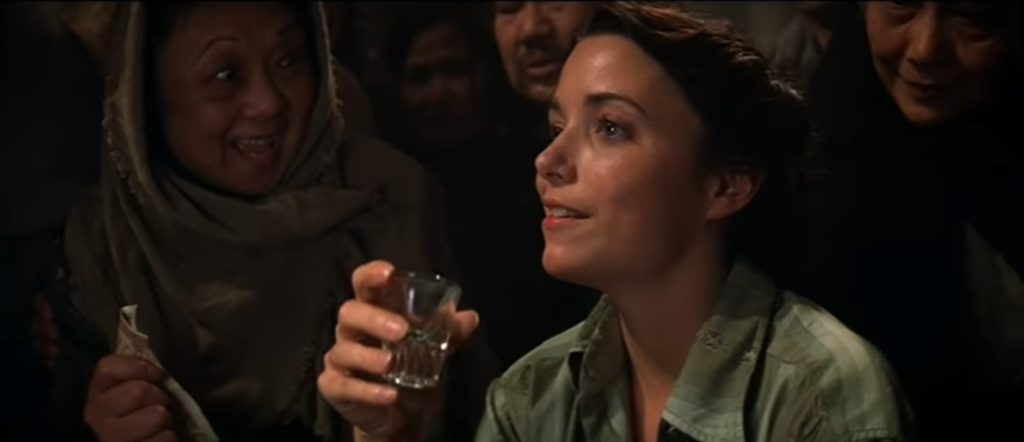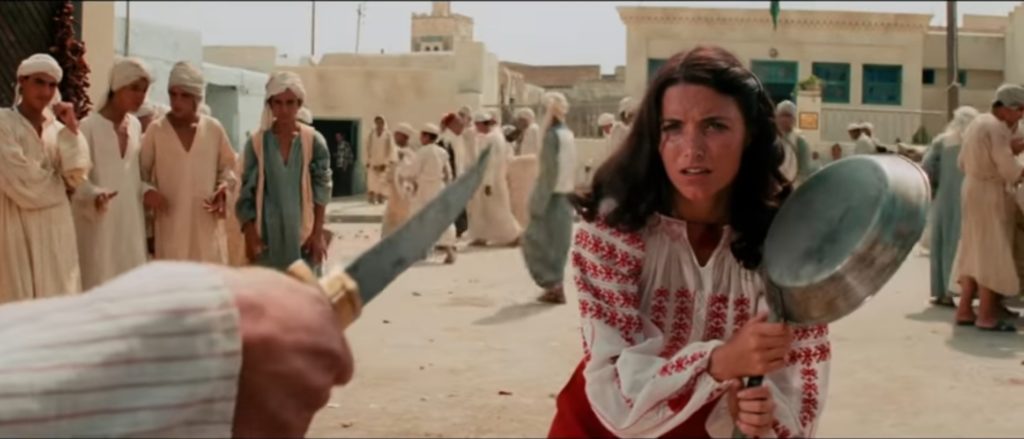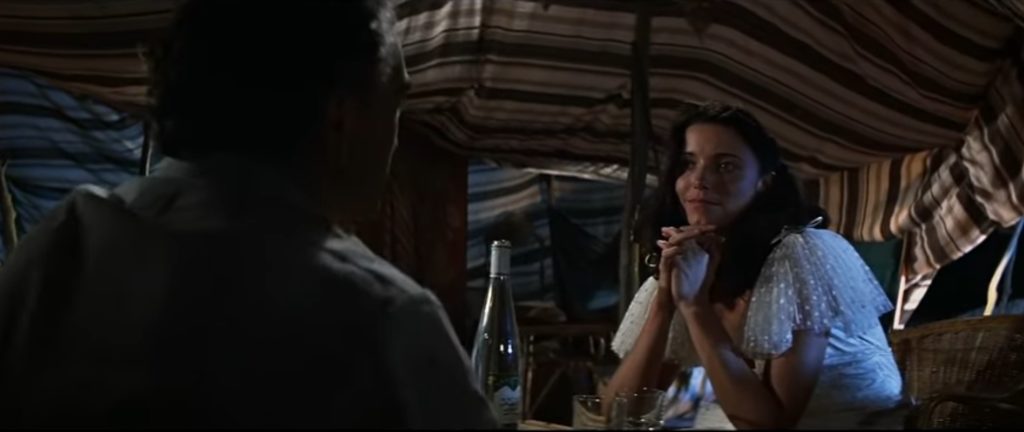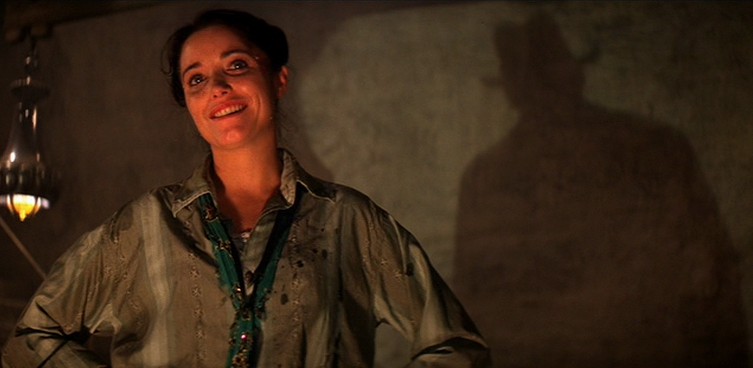Let me preface this by saying that I adore Raiders of the Lost Ark (1981). I will unquestionably hail it for years to come as both Steven Spielberg’s magnum opus and a truly timeless adventure film. Even if I didn’t think it was both of these things, little can be said to deny the impact Indiana Jones’ first onscreen outing has had on the action and adventure genres since its inception. Yet when people talk about Raiders as a finely structured homage to classic 1930s film serials with 1980s blockbuster action sensibilities, the presence of Harrison Ford’s charismatic Dr. Jones usually rests at the center of that conversation. Even the name of the film itself has been co-opted, rebranded, and falsely embraced as Indiana Jones and the Raiders of the Lost Ark, just to make it easier to market alongside a trio of sequels that, despite bearing the name of the heroic protagonist, have not come close to matching their originator’s ability to develop character through action, and vice versa. To whom people don’t always alot their praise is Marion Ravenwood (Karen Allen), the film’s female lead who serves as Indy’s sidekick and companion during his search for the Ark of the Covenant. And now that popular culture has had 40 years to consider the enduring legacy of the film, it is high time that we drop the “sidekick” label and acknowledge the heroic role played by Marion herself.
Of course, it’s impossible to discuss Marion’s character, or even Raiders of the Lost Ark at all, without getting around the illicit circumstances surrounding her complicated relationship with Indy, which actually began ten years prior to the search for the Ark while she was a teenager. As her father, Abner Ravenwood, mentored the promising, whip-carrying archaeologist, the emotionally vulnerable Marion was pulled in by Indiana’s irresistible charm, a quality the film doesn’t hide as he is swooned over by his plethora of female students, and the two began a secret relationship that ultimately dissolved Abner’s trust in his young apprentice. Luckily, Marion has learned what these young women have not. When we meet her again in the Nepalese tavern she owns (a very significant divergence from what one would expect from a woman in the 1930s), Karen Allen’s portrayal of the character allows us to recognize that she is no longer willing to be defined by the men in her life, as Marion’s first instinct upon seeing her old flame is to land a mean right hook upon his jaw before reminding him, “I was a child. I was in love. It was wrong and you knew it.”

This isn’t as much of a throwaway line as it once was, but even then, it’s one that Allen always seemed very taken in by, as Marion spends the remainder of the film reminding Indy how wrong it was, indeed. The original drafts of the script made this scenario much, much worse, but the decision for the two to enter an inappropriate, not to mention illegal, relationship, was always intentional (only Spielberg seemed hesitant to include this story point during the script revision sessions with George Lucas and Lawrence Kasdan). With this in mind, Allen’s performance serves as a one-way ticket to seeing around the box that the film, and the serials it honors, would have otherwise placed Marion in.
For better or worse, Indiana Jones was always meant to be a rougher, if not tougher, James Bond; one who isn’t afraid to get his hands dirty, literally. That distinction has the added, inherent bonus of “ladykiller” status, but you wouldn’t know it without viewing his interactions with Marion before those with his future female companions. Even before Indy’s arrival in her parlor, as she drinks some unruly patrons under the table and walks away with a decent stack of bet money, her demeanor makes it clear that she doesn’t want or need to be saved. She’s a damsel in solitude, one willing to do anything, even if that involves taking on a group of Nazis, to ensure that “distress” is never something to consider. As she possesses the headpiece of the Staff of Ra, a vitally important tool necessary to discover the Ark’s location, she reluctantly joins Indy after besting the sadistic Major Toht (Ronald Lacey) and his small band of Gestapo officers. Though, as this partnership begins, she takes the opportunity to remind him that that’s exactly what this is: “You’re gonna get more than you bargained for. I’m your goddamn partner!”

Even when we get the sense that Marion is falling into the expected female role at times, whether that’s as a kidnapping victim or merely as a piece of ass there to be gawked at — this was the 80s, unfortunately — it is often these moments in which she is independent of Indiana that the best parts of her personality shine through. Much of her agency is the product of none other than Karen Allen, who developed many of Marion’s actions and decisions herself. Speaking about the film for Bustle in 2016, Allen stated, “The script had this very strong character that we met initially. But then, over the course of the script, there were some times when I felt I wanted to make more active choices […] One of the things I fought for in making the film was when there was a moment in which she might have tipped into the damsel in distress mode, I thought, ‘no no no, let her grab a frying pan and knock somebody over the head with it.’”
That Allen took the opportunity to make Marion someone she wasn’t originally meant to be is more than revealed in the finished product, especially in the way her character manages to use the preconceived notions all of the male characters have about her against them. Nowhere is this better demonstrated than in the way she handles Indy’s archaeology rival, Rene Belloq (Paul Freeman), whom the Nazis have hired to excavate the sands of Cairo for the Ark. Having been kidnapped by Belloq and left there by Indy to allow him more time to dig for the Ark, Marion does not sit quietly. Quickly recognizing the attraction Belloq has toward her, she does what she has several times before and attempts to drink him under the table while secretly holding onto a knife to make her escape. Though Major Toht manages to thwart her attempt, that she makes an attempt is something to revere. No need to wait for someone who’s not coming when you can just save yourself. Why be desperate when you can be daring, accept fate when you can tempt it and maybe, just maybe, change it?

For the entirety of Raiders of the Lost Ark, Marion remains in full control of both her body and her personality, a rarity for female characters at the time of the film’s release. She’s granted depth with personal demons from her past and emotional vulnerability when the situation deems it appropriate for her to grow alongside Indy. She avidly rejects the notion of being anything other than a sassy, humane rebel, and Indy’s equal in every way. This she does while still maintaining her femininity. In so many ways, it’s easy to conclude that Indy often forsakes everything she does for him and, in this way, doesn’t deserve her. This only makes her return in the much-derided Indiana Jones and the Kingdom of the Crystal Skull feel so unrewarding, as it’s clear that she deserves so much more than the happy ending Indy gets with her. But before the franchise canon insisted upon her giving into Dr. Jones’s charm, her first appearance alongside her future husband proved just how ahead of her time, and ahead of all the men around her, she was.

Comments